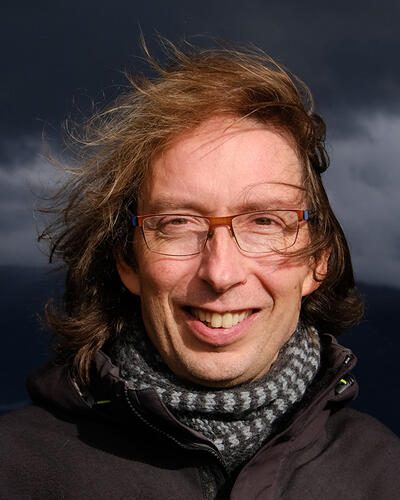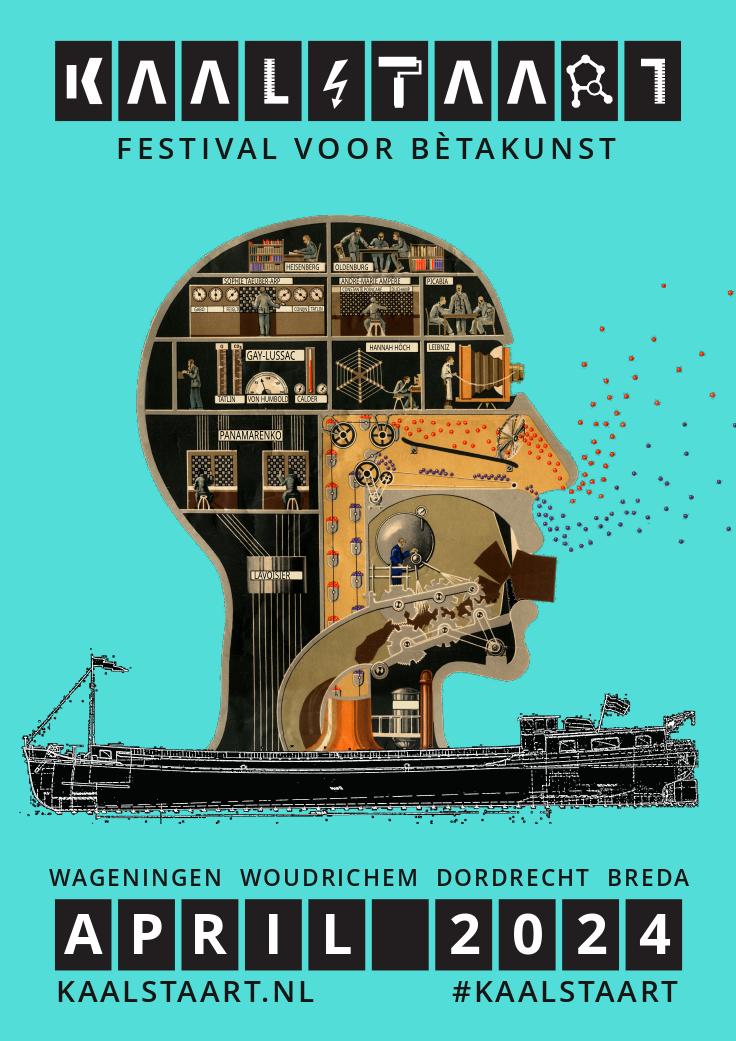Kaalstaart is a traveling festival for STEM art. Artists reflect on scientific questions.
Bèta art draws inspiration from science, technology and nature. Visual art, stage art, research and new cooperations will be shown to the audience in and around a number of historic cargo ships.
Questions for 2024
 Frans Snik (Astronomy): "Chances are that in the next decades astronomers will find indirect evidence of the existence of primitive life on a planet revolving around a nearby star. These discoveries will have great significance for humanity, and therefor it is all of humanity will have to relate to them. How can scientists (not just astronomers) and artists already cooperate to shape the search for extra terrestial life? What exactly are we looking for? When are we certain enough that our telescopes are really icking up signs of life? And what will be our erthly reaction when they do?"
Frans Snik (Astronomy): "Chances are that in the next decades astronomers will find indirect evidence of the existence of primitive life on a planet revolving around a nearby star. These discoveries will have great significance for humanity, and therefor it is all of humanity will have to relate to them. How can scientists (not just astronomers) and artists already cooperate to shape the search for extra terrestial life? What exactly are we looking for? When are we certain enough that our telescopes are really icking up signs of life? And what will be our erthly reaction when they do?"
 Jaap-Henk Hoepman (Informatics): Internet services tend to grow exponentially because marginal costs are almost zero. It hardly matters whether you have 100, 100,000, or 100,000,000 users. n this aspect, the virtual world differs from the traditional physical world, in which the laws of nature impose constraints. That is not always bad. Indeed, a the vurtual world could do with a little friction. That could prevent fake news from being able to spread so fast, and governments and companies from monitoring us 24/7 without significant costs. What kinds of 'friction', what laws of nature, could or should also apply in the virtual world? And how could these be enforced?
Jaap-Henk Hoepman (Informatics): Internet services tend to grow exponentially because marginal costs are almost zero. It hardly matters whether you have 100, 100,000, or 100,000,000 users. n this aspect, the virtual world differs from the traditional physical world, in which the laws of nature impose constraints. That is not always bad. Indeed, a the vurtual world could do with a little friction. That could prevent fake news from being able to spread so fast, and governments and companies from monitoring us 24/7 without significant costs. What kinds of 'friction', what laws of nature, could or should also apply in the virtual world? And how could these be enforced?
 Diana Wildschut (Citizen Science): "Humans are a playful species. We are curious and creative. We start laughing when we are surprised. Many adults lose their urge to play and explore. How can we entice them to awaken their curiosity and explore?"
Diana Wildschut (Citizen Science): "Humans are a playful species. We are curious and creative. We start laughing when we are surprised. Many adults lose their urge to play and explore. How can we entice them to awaken their curiosity and explore?"
 Onno Zijlstra (Philosophy): "We live in times of great insecurity and incerdible polarisation. And that while our species is not doing too well. Visual artists create images in which they isolate, highlight and materialise meanings from both everyday experience and the world of technology and science. They set their impression up for others to see. Since the work does not have an immediate practical purpose in mind, viewers are free to have their own interpretation. That relative detachment and freedom allows for the conversation between clashing ideas to become a "loving battle". The polemicist Karl Kraus was reproached at the beginning of the first world war for focussing on details while the world was on fire. Kraus responded with: 'If only everyone did that.' Watching and reflecting does not deplete energy sources."
Onno Zijlstra (Philosophy): "We live in times of great insecurity and incerdible polarisation. And that while our species is not doing too well. Visual artists create images in which they isolate, highlight and materialise meanings from both everyday experience and the world of technology and science. They set their impression up for others to see. Since the work does not have an immediate practical purpose in mind, viewers are free to have their own interpretation. That relative detachment and freedom allows for the conversation between clashing ideas to become a "loving battle". The polemicist Karl Kraus was reproached at the beginning of the first world war for focussing on details while the world was on fire. Kraus responded with: 'If only everyone did that.' Watching and reflecting does not deplete energy sources."
 Jeroen van der Sluijs (Earth sciences): "Urgentevproblems like climate change and the loss of biodiversity are characterised by intamable uncertainties in scientific knowledge, difficult to overcome conflicts over values, and big interests at stake. Such issues call for post-normal, pluralistic, science that is open about uncertainties, that engages in dialogue with perspectives and types of knowledge other than natural scientific ones needed to solve such problems, and that can build bridges between all the various forms of knowledge that can contribute to solutions. How can art lure science out of its ivory tower of certainties?"
Jeroen van der Sluijs (Earth sciences): "Urgentevproblems like climate change and the loss of biodiversity are characterised by intamable uncertainties in scientific knowledge, difficult to overcome conflicts over values, and big interests at stake. Such issues call for post-normal, pluralistic, science that is open about uncertainties, that engages in dialogue with perspectives and types of knowledge other than natural scientific ones needed to solve such problems, and that can build bridges between all the various forms of knowledge that can contribute to solutions. How can art lure science out of its ivory tower of certainties?"
Sailing plan
| Date | Location | Time | Program | Entrance |
|---|---|---|---|---|
| Fr 05 April | Rijnhaven, Pabstendam, Wageningen | 20h | Bèta stage | |
| Sa 06 April | 11-22h | Exhibition | Pay what you want | |
| Su 07 April | 11-17h | Exhibition | Pay what you want< | |
| Za 13 april | Waterpoort, Woudrichem | 12-22 uur | Exhibition | Pay what you want< |
| Zo 14 april | 12-17 uur | Exhibition | Pay what you want< | |
| Fr 19 April | Binnenvaart museum, Werf van Spaan, Dordrecht | 15h | Opening | Notice: Evening program has been cancelled! |
| Sa 20 April | 12-22h | Exhibition | Pay what you want | |
| Su 21 April | 12-17h | Exhibition | Pay what you want | |
| Th 25 April | Belcrumhaven, Veilingkade, Breda | 20h | Maker meetup | |
| Sa 27 April | 12-22h | Exhibition | Pay what you want | |
| Su 28 April | 12-17h | Exhibition | Pay what you want |
See an impression of previous festivals below.







 info@kaalstaart.nl - p/a Heiligenbergerweg 34, 3816 AK Amersfoort -
info@kaalstaart.nl - p/a Heiligenbergerweg 34, 3816 AK Amersfoort -